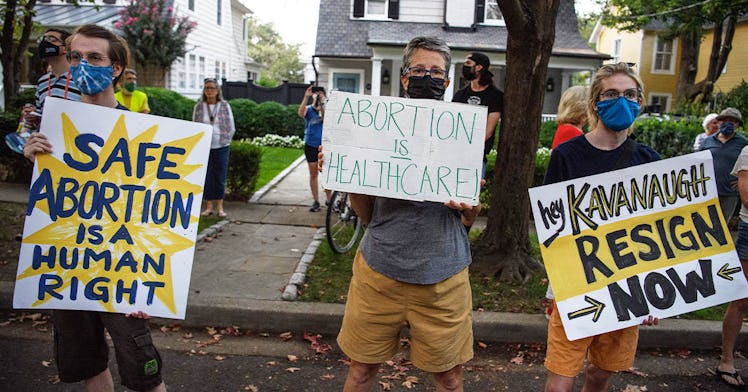How Two Texas Abortion Lawsuits Filed Against Doctor Are Not What They Seem
A doctor admitted to performing abortions in Texas after the six-week-mark. Two people suing him might be doing so to overturn the law.

Texas’s new anti-abortion law was designed to get around the constitutional right to an abortion without running afoul of the “undue burden” measure codified by the Supreme Court in Roe v Wade and Planned Parenthood v Casey.
The law makes most abortions illegal, outlawing the procedure at six weeks, which functionally bans 85 to 90 percent of abortions in the state. There are few exceptions to the rule. The law has avoided scrutiny so far because it doesn’t make the State of Texas or any other government responsible for enforcement. Instead, it allows anybody — a random citizen, a neighbor, an activist — to sue anybody else who they suspect of performing an abortion or helping someone get an abortion after the six-week mark.
The law has obviously been slammed by pro-choice advocates who have already watched abortion access slowly get chipped away in the massive state, and the law has already affected people’s lives. (Oklahoma reported seeing nearly 650 percent more patients from Texas at abortion clinics after the law took place 20 days ago.)
Now, the first test of this new law has arrived, as two people have sued a Texas abortion clinic doctor, The New York Times reports. The physician in question is Dr. Alan Braid, a San Antonio-based OB/GYN who recently wrote an opinion essay in The Washington Post about his plans to continue performing abortions in violation of the state law, which he calls “blatantly unconstitutional.”
The plaintiffs hail from Arkansas and Illinois, the Times reports, as apparently you don’t actually need to live in Texas to bring a case, though the cases get locked in state courts so they don’t have to adhere to federal law or precedent.
But in an even stranger twist, neither man appears to be an anti-abortion activist. In fact, both cases seem to be challenging the very law they’re suing under.
KSAT, a local news outlet in San Antonio, reports that the Illinois plaintiff, Felipe Gomez, is a disbarred attorney who described himself as “pro-choice.” And the Associated Press reports that Gomez filed his lawsuit specifically to challenge the constitutionality of the new law. Gomez also told AP that if he won the case, he’d probably donate the money to an abortion rights organization or patients of the Texas doctor.
The other plaintiff, Oscar Stilley, said that he’s “not pro-life” either, the Times reports, merely challenging the law. But Stilley, which the complaint describes as a “disbarred and disgraced” lawyer, does intend to keep the money, calling it a “win-win,” per the Times. (Yes, in another very odd twist on this strange story, both plaintiffs are disbarred lawyers.)
Needless to say, a plaintiff suing someone under a new law specifically to challenge the legality of that same law is a strange legal situation. And anti-abortion activists don’t seem to be taking kindly to these initial two cases either.
John Seago of Texas Right to Life, an anti-abortion group (the same one that had their abortion tips hotline flooded with Shrek Memes by TikTok teens when the law was enacted) told the Times that he thinks they’re both “self-serving legal stunts.” But if doctors continue to perform abortions in Texas, it’s possible that anti-abortion activists could bring more straightforward suits under the law.
In his Washington Post essay, Dr. Braid called abortion “an essential part of health care.” He noted that in 1972, his first year of medical practice and one year before abortion was legalized nationwide, he witnessed “three teenagers die from illegal abortions.”
Although Texas has now banned nearly every legal abortion and the Supreme Court has done nothing to prevent this law from taking effect, Dr. Braid wrote that he has continued providing this medical care to his patients, saying “I can’t just sit back and watch us return to 1972.”
Since the law took effect this month, many abortion providers in Texas have stopped providing care to many patients, the Texas Tribune reports. In addition, abortion clinics in nearby states like Oklahoma and Kansas have seen a massive influx of patients coming from Texas, according to The 19th.
These anecdotes illustrate another probable result of the new law — wealthier people who can afford to travel out of state will often go somewhere where abortion rights are protected, while poorer people will have a harder time finding legal, safe abortions. The 19th also notes specifically that immigration checkpoints in southern Texas will likely prevent some people from leaving the state to get medical care.
There are many reasons that people look for abortions, from family planning choices to medical needs. And without access to the procedure, families can be pushed into poverty and pregnant teenagers can become more likely to not finish school after giving birth. As Texas doctors and clinics attempt to avoid lawsuits, many people will likely go without healthcare and face some of these repercussions.
The US Department of Justice has asked a court to block the Texas law. But for now, it’s unclear where these two initial lawsuits against Dr. Braid will lead and the law remains in place. With a solidly conservative Supreme Court — a court in which Brett Kavanaugh sits at the ideological middle, according to SCOTUSBlog — some anti-abortion conservatives may hope that lasts.